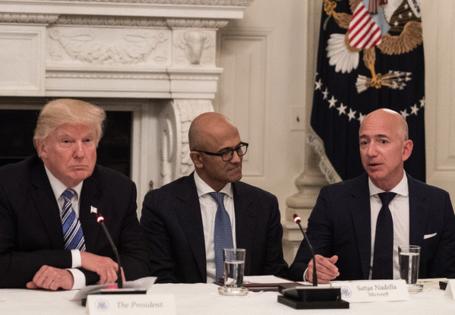Beth Kowitt: CEOs think silence will save them from Trump. They're wrong
Published in Op Eds
If the run-up to the election can be taken as a preview, don’t expect corporate America to act as any kind of check to the Donald Trump presidency redux.
The strategy most CEOs adhered to during the campaign cycle was to do and say as little about politics as possible. It’s the same approach they seem poised to carry over into Trump’s next term — more interested in staying in the president-elect’s good graces than they are in acting as a counterweight to his bullying tactics and lack of civility. No one wants to attract the rage of the Trump White House, especially those who have been there before.
Just ask Jeff Bezos. During Trump’s first term, Bezos’s ownership of the Washington Post and what Trump deemed its critical coverage of his administration was blamed for costing Amazon.com Inc. a $10 billion cloud computing contract with the Pentagon. Bezos took no chances this time around. Citing a “perception of bias,” he intervened to make sure The Post did not endorse Kamala Harris. But when Trump won, that didn’t stop him from making his own public statement on X, congratulating the president-elect “on an extraordinary political comeback and decisive victory.”
But any CEO who plans to spend the next four years staying silent should remember that the rule of law and democracy are not only good for business but fundamental to a functioning economy. There will come a time when corporate America will need to stand up to the Trump administration because its policies are so morally repugnant or so threatening to economic stability that they have no choice. CEOs and boards need to start thinking now about what their red lines will be and how they’ll respond.
The most effective course of action will be to use industry associations like the Business Roundtable to issue statements that are signed by a group of CEOs. Since few companies will have the stomach to take on the White House alone, these kinds of coalitions will help protect against retaliation and show strength in numbers. The business community already knows how to do this. For example, after Trump issued an executive order banning visitors from Muslim-majority countries just days into his first term, 130 companies filed an amicus brief with the U.S. Court of Appeals, which said the order “violates the immigration laws and the constitution.”
Rather than making big bold public pronouncements that put a bullseye on their companies, CEOs can focus on internal communications that address how policies directly impact employees. A number of companies have already shifted in this direction. When the Supreme Court overturned Roe v. Wade, there were few statements that denounced the decision. Instead, most companies that addressed it did so by saying they would reimburse travel expenses for employees needing to seek an abortion out of state.
Corporate America used to be more willing to play the hero rather than the lackey. There were plenty of other occasions during Trump’s first term when CEO pressure had real impact. Business leaders stepped down from and disbanded Trump’s business advisory groups after he blamed “many sides” for a deadly White supremacist rally in Charlottesville, Virginia. They pulled back on doing business in North Carolina after the state passed a transgender bathroom ban, which it repealed after the economic pressure. After the January 6 riots, they put out statements condemning the attacks on the capitol and threatened to pause political donations.
The political and business landscape has shifted dramatically since then, and it’s hard to imagine this kind of CEO activism taking place today. The tech sector has lost its appetite for the save-the-world ethos that fueled its opposition to Trump in 2017. The rhetoric coming from the Trump camp that once horrified and embarrassed CEOs now gets a pass or an eyeroll. Corporate America’s enthusiasm for DEI and ESG has evaporated to the point that there’s not much of these formal programs left to protect. (As my Bloomberg Opinion colleague John Authers astutely put it, “Trump will bury ESG, but it was already dead.”) Right-leaning consumers have punished brands from Deere & Co. to Harley-Davidson Inc. to Tractor Supply Co. that let off any scent of “woke capitalism.”
Employees have changed too. C-Suites were often driven to speak up during Trump’s first term to placate an outraged workforce. Today the competitive job market that forced CEOs to take a stand isn’t so tight, and the outcome of the election refuted the idea that young employees want or expect their CEOs to act as a moral counterforce to Trump. The electorate knew what was on the line this time around, and decisively voted for it anyway.
Like their CEOs, employees right now are exhibiting political fatigue. The New York Times reported that over at Alphabet Inc., where executives have cracked down on political discussions at the once-outspoken company, there wasn’t much election talk to police. And at Amazon, management didn’t once mention the election during a two-hour meeting about the future of the company.
That’s working now, but as the shift from the first Trump term to the current moment proves, things change. Will this level of passivity last for four, likely chaotic, years? I expect workers too will discover their red lines. When the Trump administration crosses them, they’ll want to hear from the big bosses — and the excuse of neutrality just won't cut it.
_____
This column does not necessarily reflect the opinion of the editorial board or Bloomberg LP and its owners.
Beth Kowitt is a Bloomberg Opinion columnist covering corporate America. She was previously a senior writer and editor at Fortune Magazine.
_____
©2024 Bloomberg L.P. Visit bloomberg.com/opinion. Distributed by Tribune Content Agency, LLC.




























































Comments